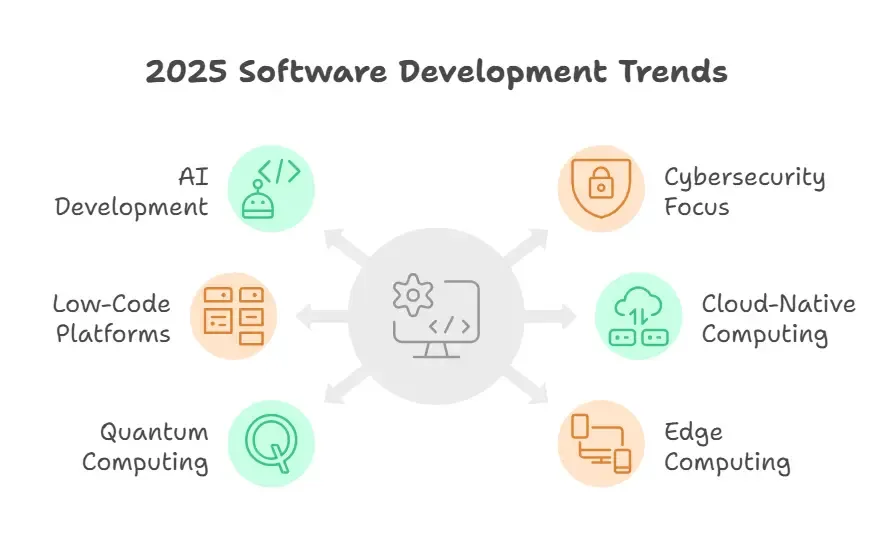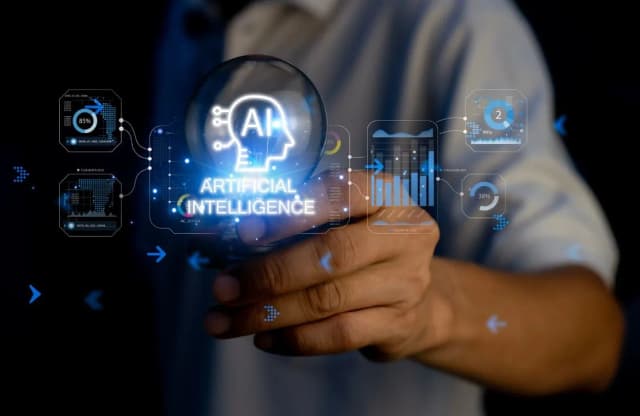Software Developer Career Roadmap: Essential Roles and Skills

Software development is no longer about writing code - AI, cloud computing, and cybersecurity are significantly influencing software development in 2025. Google revealed that artificial intelligence now writes 25% of its new code, thus signaling a dramatic shift in software development.
This guide explores the essential skills for software developers in 2025, from technical expertise to crucial soft skills. You'll discover how to navigate the changing demands of the industry, adapt to emerging technologies, and future-proof your career in an AI-driven world.
This guide explores the essential skills for software developers in 2025, from technical expertise to crucial soft skills.
Why Software Development Roles Have Changed in 2025?

The software development landscape continues to evolve at a breakneck pace, reshaping career opportunities and job requirements across the industry. As we look ahead to 2025, understanding the shifting dynamics of software development roles becomes crucial for career planning.
Current Industry Landscape
The tech sector remains one of the fastest-growing employment sectors globally despite recent fluctuations. In 2025, the demand for software developers has gone up to 22% from 17% in 2023. The field offers remarkable stability compared to other industries. Furthermore, the software developer role consistently ranks among the top 5 most in-demand tech positions.
The tech sector is evolving at a fast pace, all thanks to AI. With the growing importance of AI, automation, and cybersecurity, software developers are required to upskill continuously.
Rise of AI-Powered Development
Artificial Intelligence (AI) and Machine Learning (ML) are reshaping software development. AI-powered coding assistants, such as DeepSpeek, GitHub Copilot, and Tabnine, automate repetitive coding tasks, helping developers write efficient code faster. This has shifted developers’ roles from just writing code to optimizing AI-generated code, focusing on problem-solving, and integrating AI-driven solutions into applications.
Increased Focus on Cybersecurity
With cyber threats becoming more sophisticated, security is no longer just the responsibility of security teams - it’s now a core part of a developer’s job.
Rise of Low-Code and No-Code Platforms
The low-code/no-code revolution has changed the way applications are built. While these platforms reduce the need for manual coding, developers are still required to customize, integrate, and enhance applications beyond the capabilities of these tools. Developers now focus on creating APIs, automating workflows, and enabling seamless integrations between different services.
Adoption of Cloud-Native and Serverless Computing
Companies are increasingly adopting cloud-native technologies and serverless computing to improve scalability and efficiency. As a result, software developers must now be proficient in cloud platforms like AWS, Azure, and Google Cloud, as well as containerization tools such as Docker and Kubernetes. Understanding how to develop and manage microservices has become an essential skill.
Quantum Computing
Quantum computing is set to revolutionize software development by solving complex problems at an unprecedented scale. Quantum algorithms, such as Shor’s algorithm and Grover’s search, significantly accelerate tasks like cryptography, optimization, and machine learning.
Edge Computing
With the exponential rise in IoT (Internet of Things) devices, edge computing is becoming a critical part of modern software architecture. It reduces the need to send massive amounts of data to cloud servers, cutting down on bandwidth costs and network congestion, and also provides enhanced security.
Need for Cross-Functional Collaboration
Modern software development is no longer limited to just writing code. Developers now work closely with data scientists, security analysts, UX/UI designers, and business teams to create user-friendly, secure, and scalable applications. Strong communication and collaboration skills are more important than ever.
Key Software Developer Roles: Obsolete vs Emerging
As the tech industry continues to evolve, software developer roles and responsibilities are becoming increasingly specialised. Following this trend, several key positions are emerging as particularly valuable in the job market, while others are becoming obsolete in 2025.
Roles Becoming Obsolete | Emerging Roles |
| Traditional Frontend Developer – With AI-assisted code generation and low-code platforms, basic UI development is increasingly automated | AI-Augmented Developer – Works alongside AI tools to optimize, refine, and validate AI-generated code |
| Manual Quality Assurance (QA) Tester – Automated testing tools powered by AI are replacing repetitive manual testing | AI-Driven QA Engineer – Focuses on implementing and managing AI-powered automated testing frameworks |
| Legacy System Developer – Companies are moving away from maintaining old monolithic systems in favor of modern, scalable architectures | Cloud-Native Developer – Specializes in microservices, serverless computing, and cloud-based development |
| Traditional Database Administrator (DBA) – With the rise of Database-as-a-Service (DBaaS), many traditional DBA tasks are now automated | DataOps Engineer – Manages real-time data processing, integration, and automation for AI-driven applications |
| Basic Mobile App Developer – No-code/low-code platforms allow non-developers to build simple apps without extensive coding knowledge | Multi-Platform App Developer – Creates cross-platform applications using frameworks like Flutter and React Native |
| Generalist Backend Developer – Businesses now seek specialized skills rather than broad backend expertise | Blockchain Developer – Develops decentralized applications (dApps) and smart contracts for industries like finance and supply chain |
| On-Prem DevOps Engineer – The shift to cloud-native development reduces the need for traditional DevOps in on-prem environments | DevSecOps Engineer – Integrates security into DevOps practices, ensuring compliance and vulnerability management |
| Traditional IT Support Engineer – AI chatbots and automated IT management tools are handling basic troubleshooting | AI/ML Engineer – Designs and deploys AI-powered solutions, from recommendation engines to intelligent automation systems |
Ask yourself these questions when planning your career path:
- Which specialisation aligns with your natural strengths and interests?
- Does your current skill development match industry salary trends?
- How might emerging AI tools affect your chosen specialisation?
Essential Skills for Software Developers
Succeeding as a software developer in 2025 requires mastering both technical expertise and crucial soft skills.
Technical Proficiency Remains Crucial
Programming languages continue to form the foundation of developer skills. Python leads in AI and data science projects, while JavaScript dominates web development with its versatility in front-end and back-end frameworks. Java remains indispensable for enterprise-level applications, prized for its stability, efficiency, and scalability.
For performance-critical systems, C++ provides unrivalled control despite its steeper learning curve. Meanwhile, SQL knowledge grows increasingly valuable as organisations implement AI projects requiring clean, well-structured data.
Beyond languages, developers must embrace AI-powered development tools that automate coding tasks, optimise code quality, and facilitate intelligent debugging. These tools enhance productivity while allowing developers to focus on solving complex problems rather than repetitive tasks.
Essential Soft Skills for Career Growth
Technical expertise alone isn't enough. First, problem-solving stands out as fundamental - shifting from merely "writing code that works" to "solving problems with code" marks the transition from junior to senior roles. Second, communication skills prove vital, as even the most brilliant solutions require clear explanations to both technical and non-technical colleagues.
Given that developers struggle with disconnected software tools and frameworks, adaptability has become non-negotiable. The ability to quickly learn new technologies and approaches ensures career longevity in an environment where technical skills have "the shelf life of a banana."
Self-motivation and time management round out the essential skills portfolio, particularly as remote and hybrid work models become standard. Finally, creativity drives innovation, helping developers find novel solutions to increasingly complex challenges.
How to Future-Proof Your Career
In today's rapidly evolving tech landscape, future-proofing your software development career requires intentional strategy. Here’s a checklist for you:
Stay Updated With Emerging Trends
- Keep up with the latest trends in AI-powered development, cloud computing, and cybersecurity.
- Experiment with modern languages like Rust, Go, and TypeScript
- Follow major tech conferences to stay informed about industry shifts.
Join Certifications or Courses for High-Demand Skills
Enhance your expertise by enrolling in courses or certification programs like
- Cloud Certifications
- Software Development Certification
- DevOps and Automation Course
- AI and Machine Learning Course
Contribute to Open-Source Projects
- Contribute to GitHub repositories related to AI, DevOps, or blockchain.
- Engage with communities like Apache, Mozilla, or the Linux Foundation.
- Collaborate with developers worldwide by fixing bugs or improving documentation
Follow Industry Leaders and Practitioners
Keeping up with industry experts can provide valuable insights into the latest trends. Some recommended resources include:
- Tech blogs and newsletters
- Podcasts
- YouTube videos
Join Tech Communities and Network Groups
Networking is crucial for career growth. Join and participate in:
- Online communities
- Meetups and conferences:
- LinkedIn & Twitter: Follow tech leaders and practitioners
Key Takeaways
The data paints a crystal-clear picture for anyone considering or currently in software development - your career prospects are exceedingly bright.
As you contemplate your career path, remember that software engineering offers three distinct tracks: individual contributor, management, and freelance/contract work. Each path presents unique opportunities, with new-entrant software developers earning a salary of up to ₹7,00,000 annually.
However, remember that software engineering is not static. Accepting that there is always more to learn represents perhaps the most vital attribute for sustainable success. Through side projects, open-source contributions, and continuous skill development, you can position yourself advantageously in this rapidly evolving field.
AI is taking center stage in automation, coding efficiency, and problem-solving. Staying ahead means continuously learning and adapting to these emerging trends. Take the next step toward an AI-driven future! Don’t fall behind; enroll today in an AI-powered software development course to gain hands-on experience with cutting-edge tools, automation techniques, and real-world applications.
FAQs
Q1. What are the most in-demand IT skills for software developers in 2025?
By 2025, the most sought-after IT skills for software developers will include cloud computing, artificial intelligence, cybersecurity, data analysis, and DevOps. Proficiency in programming languages, particularly Python and JavaScript, will remain crucial, along with a strong foundation in problem-solving and communication skills.
Q2. How can I prepare to become a successful software developer by 2025?
To become a successful software developer by 2025, focus on mastering core programming languages, developing expertise in emerging technologies like AI and cloud computing, and honing your problem-solving abilities. Additionally, invest time in improving your communication skills and adaptability, as these soft skills are increasingly valued in the industry.
Q3. Will software engineering remain a high-demand profession in 2025?
Yes, software engineering is projected to remain in high demand through 2025 and beyond. The field is expected to grow by 25% from 2021 to 2031, which is significantly faster than the average for all occupations. Businesses are particularly keen on hiring software engineers, developers, and specialists in cloud computing, database management, and systems engineering.
Q4. What is the significance of continuous learning in a software development career?
Continuous learning is crucial in software development due to the rapid evolution of technologies. It helps you stay relevant, motivated, and valuable to employers. By regularly updating your skills and knowledge, you can adapt to new tools, methodologies, and industry trends, ensuring long-term career success and growth opportunities.
Q5. How important are soft skills for software developers in 2025?
Soft skills are increasingly important for software developers in 2025. While technical proficiency remains crucial, skills such as effective communication, problem-solving, adaptability, and creativity are becoming key differentiators. These skills enable developers to work collaboratively, explain complex concepts to non-technical stakeholders, and navigate the challenges of remote or hybrid work environments.

TalentSprint
TalentSprint is a leading deep-tech education company. It partners with esteemed academic institutions and global corporations to offer advanced learning programs in deep-tech, management, and emerging technologies. Known for its high-impact programs co-created with think tanks and experts, TalentSprint blends academic expertise with practical industry experience.



